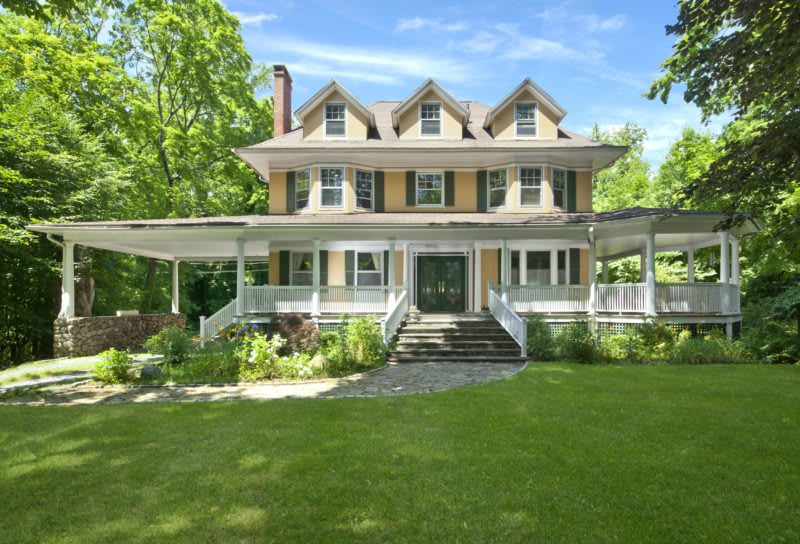Why Most Realtors Wish There Was a Zillow Alternative
Every day Zillow is putting Greenwich homeowners at a significant disadvantage, by falsely raising the monthly payments they claim are due on houses in Greenwich. This inaccurate amount appears in the header of every Zillow listing and stays on the page even when you scroll the data column. The estimated monthly payment is a key determinate as whether someone will buy, or even look at house in Greenwich. (I’d love to know if this is a nationwide issue.)
Zillow grossly inflates the taxes due on a house in Greenwich, thus increasing the monthly cost by thousands of dollars. The actual amount of the Greenwich property taxes appears in the Zillow listing, but Zillow don’t use the actual tax number in calculating the crucial monthly payment amount.
For example, 22 Byfield Lane in Greenwich pays $13,623 in annual property taxes to Greenwich. Zillow, however, estimates this property’s taxes at $42,665 or more than $29,042 higher than the actual taxes. This is 213% of the actual taxes and increases Zillow’s estimate of monthly expenses by $2,420. Cheryl MacCluskey, my co-columnist at the Greenwich Sentinel estimates that a buyer would have to have an additional $70,000 income to pay these fake taxes. The result is that many people think that they can’t afford to live in Greenwich and look elsewhere.
Even if they can afford that house in Greenwich, houses in other towns look more attractive. If you compare 22 Byfield Lane in Greenwich to 25 Common Mile Road in Easton they are both at about $2.5 million. Zillow says that you would have to able pay about $12,580 in monthly expenses to buy either home. Zillow is wrong on both accounts. The taxes they calculate for the Easton house are high by $9,733/year or $811/mo. In Greenwich, the taxes are high by the aforesaid $29,042/year or $2,420/mo.
This overestimating of taxes gets worse the lower the tax rate. For Greenwich with the lowest tax rate in Connecticut, the over estimation of monthly taxes is high by 100%, 200% and even more.
So Why Are Zillow Tax Calculations So Bad?
You would think all Zillow needs to do to calculate the tax portion of a monthly payment is take the actual taxes paid for the house as entered by the listing agent on the Greenwich MLS listing and divide by 12 months. The correct tax number is on Zillow and that number is usually accurate.
That’s not how Zillow does it. They take the list price of the house and multiple it by 1.71% and divide by 12 months. They make not one, but three basic mistakes in calculating the monthly taxes. First, the mill rate in Greenwich is 11.59 for houses not in the sewer service area (think of it as 1.159%) not Zillow’s 1.71%. Second, the mill rate is not applied to today’s list price as Zillow does, but to the assessed value on October 1, 2015. Third, the assessed tax value is 70% of what the Assessor thinks the fair market value was on October 1, 2015. So, taxes on a $2,500,000 house whose value hasn’t changed since 10/1/15 are only $20,282.50 ($2.5M assessment x 1.159% mill rate x 70% assessment ratio) not the $42,750 that Zillow reports.
Why Realtors Don’t Like Working With Zillow
Long time Greenwich agent, Denise Rosato, pointed out this bad monthly payment issue to me at an open house recently. She had been trying to fix this problem for her client by contacting Zillow. As any agent who has had to work with Zillow knows it’s a nightmare trying to get Zillow to change anything. It can take days and weeks for them to even get back to you with anything, but an automated reply. Agents know that gong through regular Zillow channels for an individual agent is a lesson in frustration.
To add insult to injury, once you do get Zillow to change something, it’s very likely that when they refresh their database in a couple of days that it will revert back to old erroneous data and you have to start all over again. I’ve had to correct the same error as many as three times.
You can take “ownership” of a listing and make certain manual changes, but once you do that, you become a slave to Zillow. All updates for open houses, price changes, status updates and anything else will now have to be entered manually by the agent forever. Lots of wrong data stays on Zillow, because it’s just too much work to fix it.
Denise sent multiple emails she had sent to Zillow trying to correct the bad tax information. She eventually got back an email from a real person at the “Zillow Help Center” that Zillow uses a county-wide blended tax rate of 1.73% times the Zestimate. (They actually use 1.71% times the list price not the Zestimate as you can see when you click the down arrow next to Property Taxes in the Monthly Cost box on any listing.)
The result of all this is Greenwich loses buyers to other towns with higher tax rates, because the Zillow data is wrong. It is wrong everywhere in Fairfield County, it is just more wrong in Greenwich.
Other Zillow Issues With Real Estate Agents in Greenwich
Zillow has been on quite a run this week, but they have not treated agents very well. Even I was shocked at the visceral hate that many agents have Zillow. Were it not for Zillow Group’s market power, they would work with another company.
For example, Zillow has the notorious Zestimate which is their estimate of what your house will sell for in Greenwich. These estimates can be wrong by millions of dollars both high and low. Several years ago, a brave Zillow salesperson came to one of our weekly office meetings. Several agents complained about how far off the Zestimates could be, (they were even worse then). He finally said, “We know they are off, but they are a great way to start a conversation with a prospective client.” It wasn’t a great selling point for us to recommend Zillow. At least with Realtor.com you get a choice of multiple valuations.
Another major problem with the Zestimates is if you look at the history, they jump around by huge percentages often for no apparent reason. I listed a property for $4.3 million and the Zestimate went from $2.6M to $4.2 million literally overnight. (I don’t know why. Maybe they thought I knew something they didn’t.)
In some ways, I feel for sorry for Zillow and the Zestimate, as Greenwich doesn’t have hundreds of identical tract homes. Even when we do have two identical floorplans, one may have a third more square footage on the tax card, because one has a walkout basement and the other house’s basement is partially buried and not part of the square footage on the tax card.
The problem is that buyers rely on these numbers. They make decisions on what to go see and how much they should offer based on the Zestimates. House don’t sell, because of Zillow’s misinformation and the difficulty of correcting this information.
Besides the monthly estimates, all of which seem to be wrong, lots of other Zillow “data” have problems. A friend of mine listed a house this week and Zillow showed it had been on the market for 75 days, not a good way to get buyers to your house in a hot market. A third agent got challenged at open house, because the list price was so much lower than the Zestimate. The house was right next to i-95, while Zillow was pricing it off of waterfront houses that weren’t near I-95. A fourth agent had an issue where the dual listing on the SmartMLS was predominating over the Greenwich MLS listing and Zillow was showing that the seller was still taking backup offers when they were not.
Bottomline, Zillow is not built for a small market, with lots of housing types, of different ages, and vastly different values and they mistreat agents and can make homes more difficult to sell.
None of This Really Matters to Zillow
Zillow has now become a digital monopoly like Facebook, Amazon, Google, or Microsoft. Digital network effects have kicked in strongly. In 2021 homeowners and agents have work with the Zillow Group. The FTC made a major mistake, when they allowed Zillow to acquire Trulia, which Zillow is putting minimal market effort behind. At this point, Zillow is buy up competitors to consolidate their market power and their zooming stock price expand into affiliated areas.
Not only is Zillow looking to control the horizontal real estate information space, they are also moving quickly to control the vertical space. Zillow now has a statewide brokerage license out of East Berlin, CT (which is a somewhat ironic location) and is a licensed broker in every other state. They have finance and closing divisions. They own Dotloop, a leading digital documents company. They are buying tract homes at bargain prices in Atlanta, Las Vegas, Phoenix, Denver and other cities and reselling them with their own agents.
The Zillow Group now has about 2/3rds of all Internet searches and is growing rapidly. Their stock has gone from $25 to an intra-day high of $200 in 11 months as analysts see them squeezing out the competition and leveraging their market power. They have become the 16,000-pound killer whale.
They are so large and growing so fast that issues like really bad data don’t matter to them. Right now, if you want to get your data corrected on a timely basis you need to sign-up as a Zillow Premier Agent for which you will have to pay thousands of dollars. To be a premier Zillow agent, you don’t have to have ever sold a house just pay them lots of money under long term contracts just to get your face on their site. They also have grown so large that they now have to grow even faster on a dollar basis to keep up their compound percentage growth. They just started to charge for apartment listings and if that works agents can expect fees for house listings that are likely still to have bad data.
Lots of their money comes from payments by agents to Zillow, they really should treat us better.











